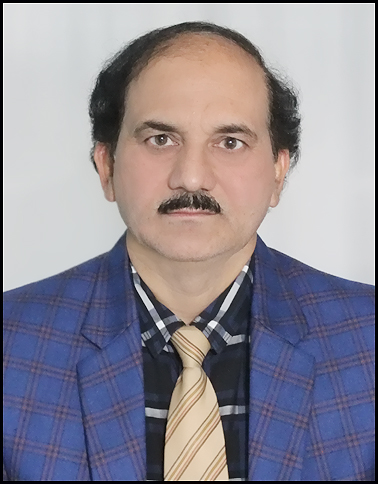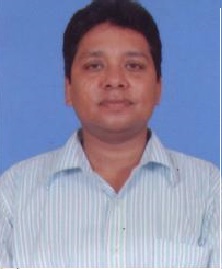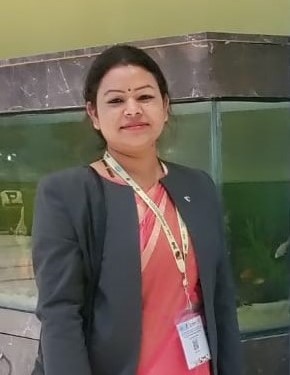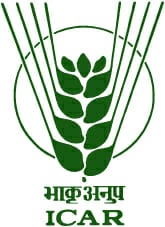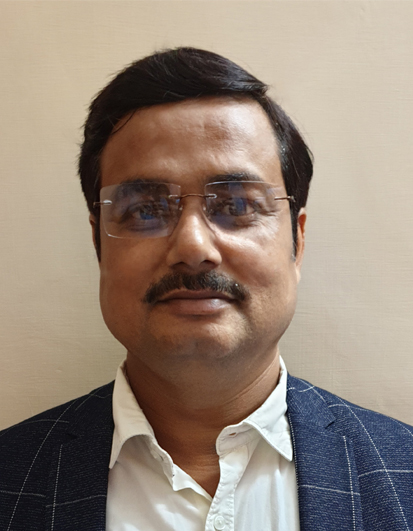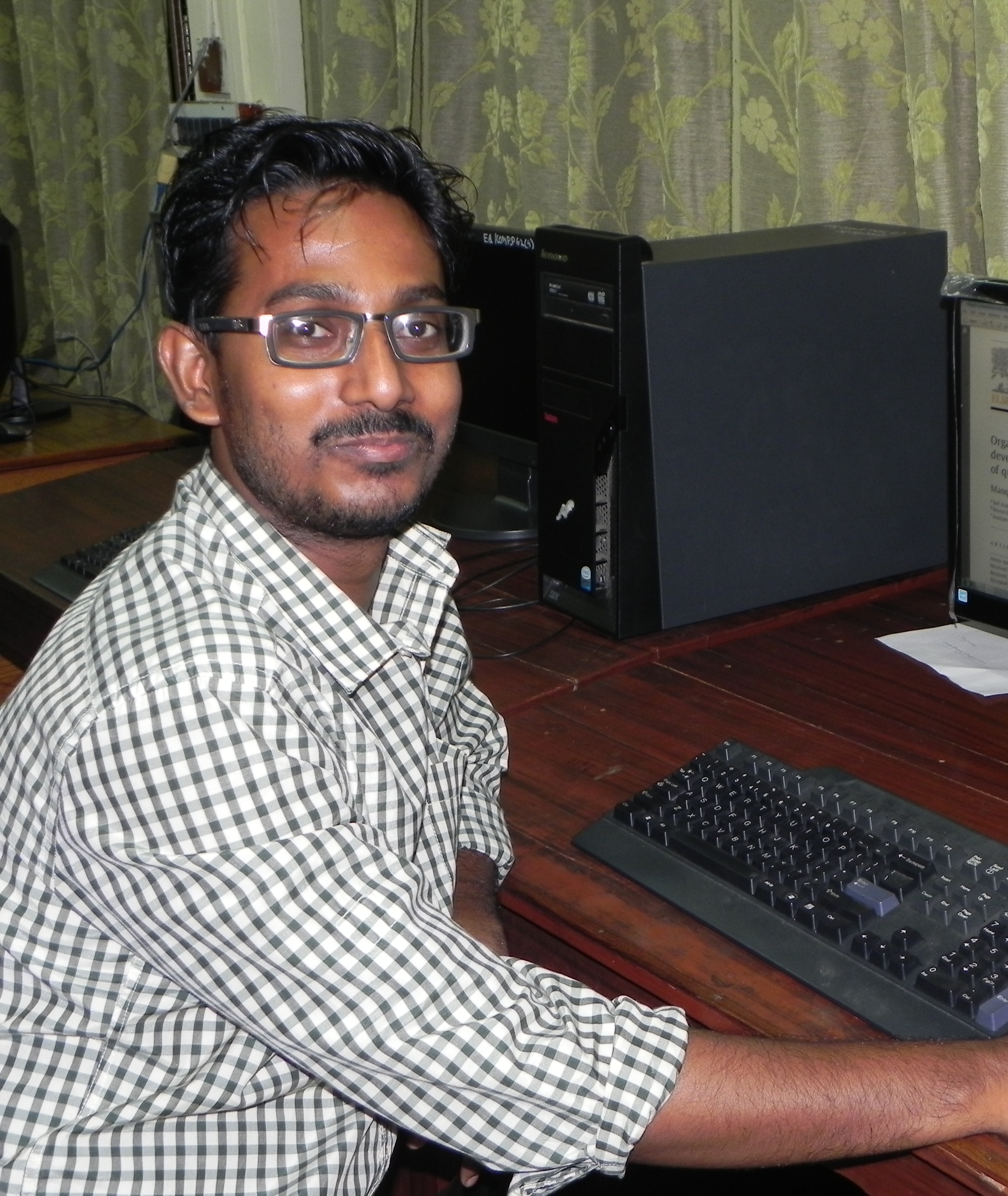Division of Social Sciences
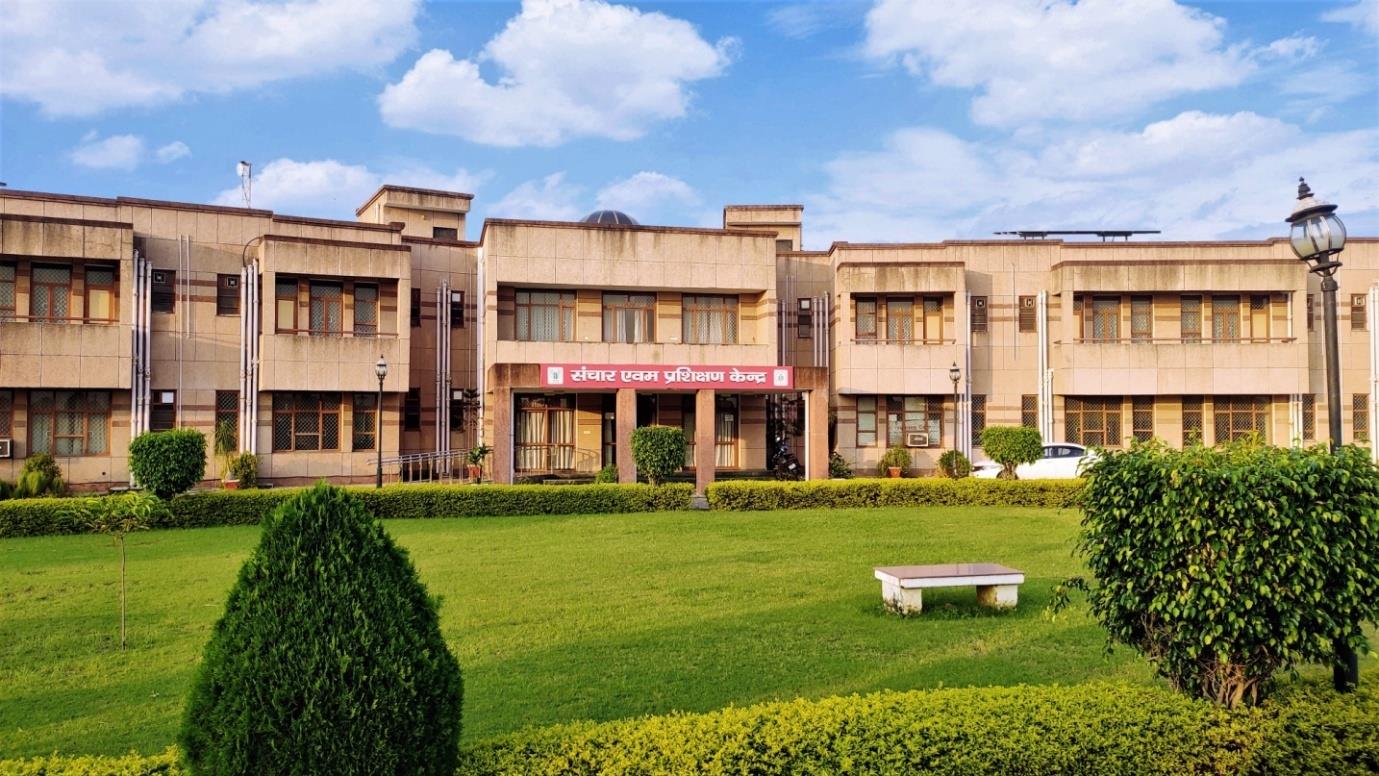
Division of Social Sciences was established on 1st August 2012. It includes of Agricultural Extension, Agricultural Economics, Agricultural Statistics and Computer Application & IT disciplines. Section on 1st August 2012. The Division is mainly focused on conducting researches towards development of extension methodologies for effective transfer of pulse based technologies to pulse growers. This included leveraging the social institutions, community based approaches and ICT inclusive methodologies. The division also developed several online database & information system and need based user-friendly softwares in addition to extend support in terms of experimental layout and data analysis. The division also engaged in capacity enhancement program for different stakeholders. The division is engaged in assessment of field applicability of pulse based technologies in farmers’ fields. Besides this, the division is also engaged in using field based extension activities like farmers’ day, field days and farmers’ fairs etc.
Thrust Areas:
- Innovative extension models for diffusion of pulse production technologies.
- ICT enabled knowledge management.
- Capacity enhancement of different stakeholders
- Development of web based data base and information systems for pulses
- Development of forecasting models. .
- Impact assessment of pulses production technologies.
- Economics analysis of pulses, marketing and consumption pattern
- Generating database and farmer’s feedback for research and extension system
Major on-going research activities
- Mega Project 1:Innovative Extension Approaches for Livelihood and Nutritional Security through Pulse Production Technology in India
- PI: Dr. Uma Sah
- Duration: 2020-25
| Sl | Sub-Project | PI | Co-PI |
|---|---|---|---|
| 1 | Development of model pulses village through integrated technological interventions for livelihood and nutritional security in selected agro-ecological regions |
Dr. Uma Sah | Dr. C. P. Nath
Dr. Man Mohan Deo Dr. Hemant Kumar Dr. Anup Chandra Dr. TN Tiwari Dr. D Dutta Dr. Surendra Ghritlahre Dr. Nidhi Kumari Dr. Rajesh Bishnoi Dr. B Lal Dr. Ashish Raut, Mr. Sunil Sunani Dr. SL Patil Dr. Sabale PR Dr. Revanappa Biradar |
| 2 | Development and evaluation of e Learning Platform for Pulse production technologies (eLeaP-Pulse) |
Dr. Uma Sah | Dr. Hemant Kumar
Dr. Rekha rani Dr. Rajesh Bishnoi |
| 3 | Impact Assessment of Pulses Varieties Developed by ICAR-IIPR |
Dr. Rekha Rani |
Dr. Uma Sah
Dr. Hemant Kumar Dr. Rajesh Bishnoi Dr. Ashish Ranjan Udgata |
- Mega Project 2: IT Enabled Data Management in Pulses for Policy Support System
- PI: Dr. Devraj
- Duration: 2020-25
| Sl | Sub-Project | PI | Co-PI | |
|---|---|---|---|---|
| 1 | Validation, implementation of online data submission & report generation system for AICRP | Dr. Hemant Kumar | Dr. Devraj
|
|
| 2 | Digitalization of quality seed production and database germplasm for pulses | Dr. Devraj | Dr. P.K. Katiyar
Dr. Amrit Lamichaney |
|
| 3 | Growth and yield stability analysis of major pulses production in India | Mr. Ashish Ranjan Udgata | Dr. Devraj
Dr. Rekha Rani |
|
Major Research Achievement
Research Achievements: Agricultural extension
Traditional extension approaches:
1. Functional seed model
A functional “seed system model” depicting roles of various stakeholders and related institutional linkages and anticipated outcomes was developed as an outcome of experimentation for improved access to quality seed of farmer-preferred varieties at a reasonable cost and at the right time among pulse farmers. The institutional support for Breeder/Foundation seed supply and technical backstopping, regular capacity building program with close functioning with village level local bodies and support institutions for partner farmers’ bodies support from seed certification agency all converged for up gradation of farmers’ skill and seed sufficiency for the region. Four farmers seed development societies were created for at village level
2.Farmer to farmer extension model.
Farmer led mechanism of Farmer to Farmers Extension (FFE) model was developed for speedier diffusion of quality seed of pulse crops among the farming community through action oriented experimentation with 143 key farmers from Bundelkhand region of UP state during 2010-16. The model was tested and was found effective in diffusing improved pulse varieties with 2.7, 4.4 and 3.7 fold increases in the number of farmers covered, area sown and quantity of seed made accessible among farmers, respectively. The unstructured diffusion was recorded to be 7480 kg (2.95 times the original seed introduced) of produce was spread as seeds among 331 additional farmers (1:2.3 ratio), covering about 300 acres (8.33 times) of area through farmers to farmer informal diffusion
3.Social institutions for strengthening pulse seed system
Progressive partner farmers were mobilized into 8 farmer led institutions in the form of registered seed societies for addressing the constrained availability of quality seed of improved pulse varieties in major pulse producing regions of UP state. These societies contributed towards strengthening the formal and informal seed system of pulses in Banda, Hamirpur, Chitrakoot, Kanpur Dehat and Jalaun districts of UP state. The societies were registered under society registration act No. 21, 1860 Uttar Pradesh Government. Member farmers of these societies were capacitated with regard to seed production technologies of pulse crops in the project and were encouraged for entrepreneurship development in pulse seed production
Table : Details of farmers’ registered seed societies
| Sl.no | Name of the farmers’ society | Members | District of UP state |
|---|---|---|---|
| 1 | Bairai Kisan SewaSamiti | 16 members | Jalaun |
| 2 | Silehera Kisan SewaSamiti | 12 members | Kanpur Dehat |
| 3 | SalempurBeejVikasSamiti | 13 members | Kanpur Dehat |
| 4 | BadapurBeejVikasSansthan | 21 members | Kanpur Dehat |
| 5 | KhurahandBeejVikasSamiti | 12 members | Banda |
| 6 | KusmaraBeejVikasSamiti | 11 members | Hamirpur |
| 7 | KallaBeejVikasSamiti | 12 members | Chitrakoot |
| 8 | BaglaiBeejVikasSamiti | 13 members | Chitrakoot |
4.Integrated farming system approach
Integrated farming system approach was implemented with multiple technological interventions for food, nutrition and livelihood security of rural households in Fatehpur districts. The components or intervention modules integrated included:
- Pulse based intervention module
- Cereal based intervention module
- Vegetable based intervention module
- Livestock based intervention module
- Entrepreneurship development
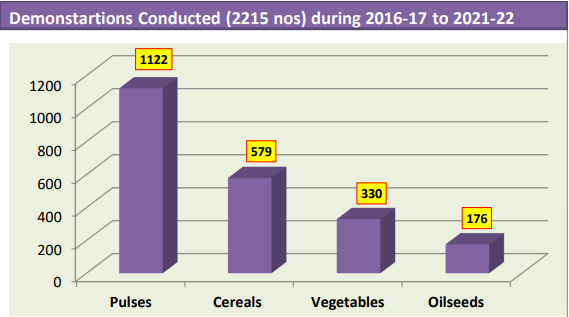
- During 2016-17 to 2021-22, a total of 1122 demonstrations were conducted on pulse based module in project villages in Fatehpur district. These demonstrations included 482, 275, 334, 16 and 15 demonstrations on summer mungbean(var. IPM 205-07), urdbean (IPU 2-43), Chickpea (var. JG 16, Ujjawal, GNG 2207), field pea (var. IPFD 12-2) and lentil var.IPL220), respectively.
Demonstrations during 2016-17 to 2021-22
Crop No. of Demonstration Yield advantage (%) Mungbean 482 16.8 Urd bean 275 16.78 Chickpea 334 13.88 Field pea 16 5.63 Lentil 15 2.22 1122
- A total 579 demonstrations were conducted under cereal based interventions which included 315 demonstrations on wheat (var. DWR 222, DWR 187, K-9423, Unnat halna -K-9423, Shatabdi-K 307, K-1006), 80 demonstrations on Maize (DKC 9108) and 184 demonstrations on paddy (var. Pant-12, Pusa sugandha-4, Pusa Basmati-1509, NDR-2064 and Bio seed -799) during the period.
Demonstrations on cereal crops during 2016-17 to 2021-22
Crop No. of Demonstration Yield advantage (%) Rice 184 20.78 Maize 80 19.95 Maize 315 20.23 579 20.32 - Under Vegetable based intervention module 330 demonstrations on improved technologies of major vegetable cultivated in the project villages were conducted. This included 150 demonstrations on okra and 50 on chilli.
Demonstrations on vegetable crops during 2016-17 to 2021-22
Crop No. of Demonstration Yield advantage (%) Okra 150 12.18 Bottle gourd 48 18.67 Sponge gourd 41 18.22 Pumpkin 40 16.56 Chili 51 31.79 330 19.48 Demonstrations on oilseed crops during 2016-17 to 2021-22
Crop No. of Demonstration Yield advantage (%) Sesamum (Pragati) 50 19.85 Mustard (Kanti) 126 26.43 176 - A total of 176 demonstrations on oilseed crops, sesame (var. Pagati) and mustard (var. Kanti)were conducted in project villages during 2016-17 to 2021-22. In addition 8 demonstrations on pearl millet(hybrid 86M84) were conducted
Demonstrations on pearl millet during 2016-17 to 2021-22
Crop No. of Demonstration Yield advantage (%) Pearl millet 8 2.35
5. Front Line Demonstrations (FLDs)
Front Line Demonstrations (FLDs) offer a direct interaction between scientists and farmers for showcasing the potential of improved production technologies to farmers in real field conditions and generating feedback for researchers. Division of social sciences conducted a total 29762 technology demonstrations on pulse technologies in different production situations and agro climatic zones of Uttar Pradesh state. . These demonstrations were organized in project villages of Kanpur Dehat, Kanpur Nagar, Jalaun, Fatehpur, Unnao, Shahjahanpur, Hamirpur, Chitrakoot and Jalaun districts of Uttar Pradesh.These participatory demonstrations on package technologies including recommended situation specific high yielding along with matching pulse production technologies.

ICT inclusive extension approaches:
- a. Websites
edalhangyanmanch is a interactive website developed in Hindi for knowledge sharing with pulse farmers, extension personnel and other stakeholders. It is a dynamic website with validated knowledge modules on seven major pulse crops i.e, Chickpea, Pigeonpea, Lentil, Urdbean, Mungbean, Fieldpea and Kabuli Chickpea covering crop production, protection and post-harvest handling technologies. Seven Varietal Information Systems for all major pulse crops is integrated to helps the user to identify recommended varieties with reference to the preferred traits for a particular district of the country. In addition, two images based diagnostic tools for insect pest & diseases and weeds of pulse crops are integrated in the website. The website has integrated Frequently Asked Questions (FAQs) pertaining to all the 7 pulse crops, video modules, Feedback window, success stories, and institute publications on the home page of the website. The website has 1,15,328 users till date
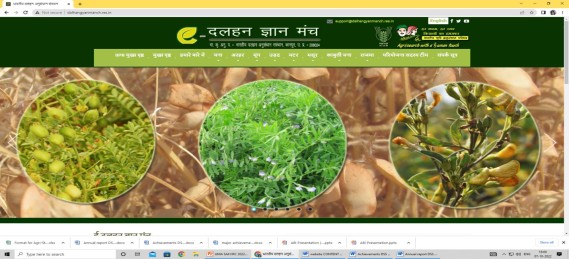
- e Knowledge Platform on Pulse Crops is an interactive and dynamic website developed for knowledge sharing with extension personnel and other stakeholders. This website has validated, well categorised and treated content on chickpea, pigeonpea, lentil, urdbean, mungbean, fieldpea and Kabuli chickpea covering crop production, protection and postharvest handling technologies. The website was released on 5th September 2021 in public domain and has been accessed by about 19072 users till date.

- b. Mobile application
(https://play.google.com/store/apps/details?id=com.smsquare.chanamitra&hl=en_IN)“Chanamitra” is a web enabled initiative developed in collaboration with AICRP (chickpea) for reaching the larger mass of chickpea growers with updated information and advisories related to improved chickpea production. The app has been developed in five languages, Hindi, English, Telegu, Kannada and Marathi. This app provides information related to improved chickpea varieties, crop production technologies, crop protection technologies for management of insect pest and diseases, post-harvest technologies as well as information related to market price and weather, which can be easily accessed by farmers and other stakeholders for making informed decisions. The application is published in Google play store and available for free download. The app was launched on 22 Dec. 2016 on occasion of closing ceremony of International Year of Pulses by Honourable Union Minister of Agriculture, Government of India, New Delhi. The said app has 4.9 star rating with 3210 plus downloads till date. Farmers are using the app across the nation for receiving solutions to the problem faced by them in their fields by sending queries in text and photographic forms.
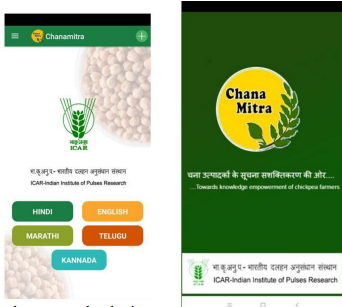
- c. Dalhan Sandesh
Farmer centric mobile based voice SMS advisory service-DalhanSandesh was designed to improve the farmers’ access to information related to pulse production technologies on real time
basis. This digital service used participatory methodologies based on farmers’ information needs and skill level. The service was adapted on basis of feedback from farmers. The service was designed for about 3500 partner farmers from seven districts of Uttar Pradesh state namely, Jalaun, Banda ,Fatehpur, Chitrakoot, Hamirpur, Kanpur Dehat, Balia and Kanpur Nagar. Context specific and need based advisories related to major pulse crops (chickpea, pigeonpea, fieldpea, mungbean, urdbean) were structured and delivered to partner farmers. More than 2, 00,000customized advisories were sent till date on pulse crops.
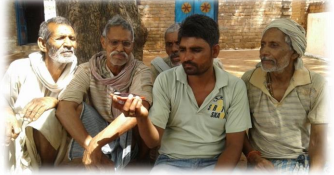
- d. Use of social media (You tube channel)
A YouTube channel “ICAR-IIPR Pulse Farmer Corner” was created in 2015 for sharing of knowledge with the pulse farmers, extension staff, development workers and other regarding improved pulse production technologies. 82 Videos on critical pulse production technologies were uploaded, that could get 113,811 views and 2053 subscribers so far. The videos have been prepared under project “Development of e learning platform on Pulses (e leap –P)” by division of social sciences.
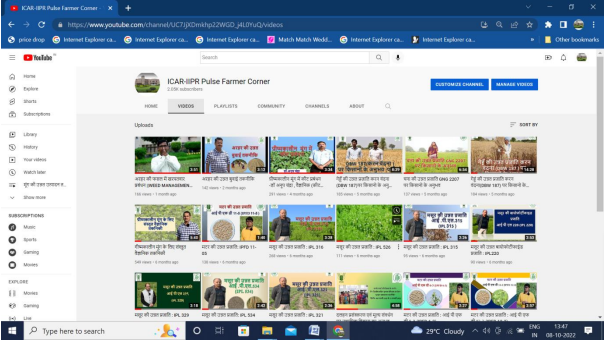
6. Value chain of Pulses
Value chain refers to the entire range of activities involved in bringing out products or services from initiation to different phases of production to distribution, reaching the consumers and final disposal after use. Value Chain Analysis (VCA) ascertains the degree of relationships among the actors and coordination mechanism with focus on the dynamics of complex linkages within a network involving suppliers, distributors, partners, and collaborators. The value chains of major pulses in Bundelkhand region of UP was documented for generating appropriate empirical evidence to better understanding among researchers for generating appropriate technological innovations as well as for supporting farmers to develop an understanding on aspects of reducing the losses and cost as along with working on building capacities for greater farm returns. Well established channels for marketing of pulses in different forms were documented from the region, for furthering the pulses from producer to consumers. The following channels were documented from the region.
- 1. Producer- Aggregator- Trader- Processer- Whole seller- Retailer- Consumer
- 2. Producer – Aggregator cum Trader- Processer- Whole seller- Retailer- Consumer
- 3. Producer – Aggregator- Trader cum Processer- Whole seller- Retailer- Consumer
- 4. Producer – Village trader- Aggregator- Trader- Processer- Whole seller- RetailerConsumer
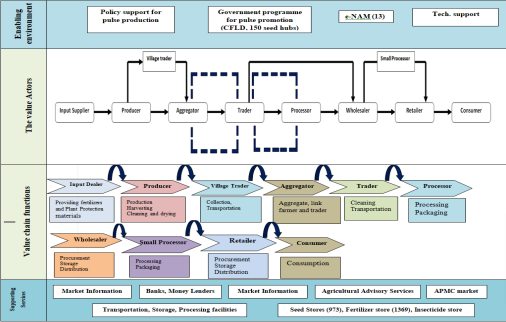
7. Sector specific program
- Tribal Sub Plan: Enhancing pulse production for food, nutritional security and rural livelihoods of tribal farmers of Madhya Pradesh and Chhattisgarh state, 8118 (Kharif-2082; Rabi-6036) demonstrations on improved pigeonpea, urdbean and mungbean production technologies were conducted in different districts of Madhya Pradesh and Chhattisgarh during 2013-14 to 2021-22.
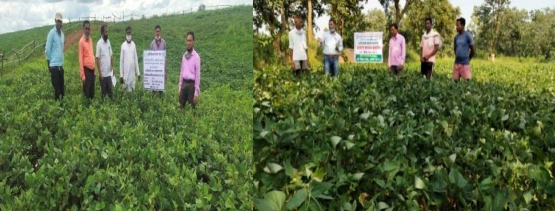
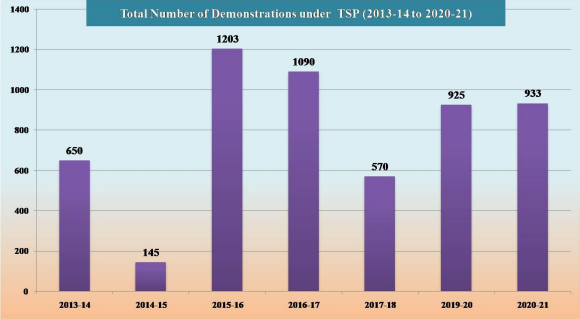
Infrastructure
- Institute Museum
The institute museum is located in and maintained by Division of Social sciences. Institute museum is a state of the art museum on pulse crops that depicts the pulse production technologies developed the Institute as well the major focus research area. In addition, the displays placed at museum also depict the institute’s mandate, time line, presence in the country and major milestones achieved
- Training Hall
A fully equipped training hall (02 Nos.) with a seating capacity of 75 people is available at division of
social sciences. The training hall has fully functional multimedia projection facilities with
internet connectivity.
Services
- Trainings
Upgrading the skills and knowledge of farmers, extension officials, input dealers and similar other stakeholders with regard to latest technical knowhow related to pulse crops is important for envisioning the increased pulse production and productivity in the country. Division of social sciences is engaged in organizing customized trainings on all important aspects of pulse production to the stakeholders.
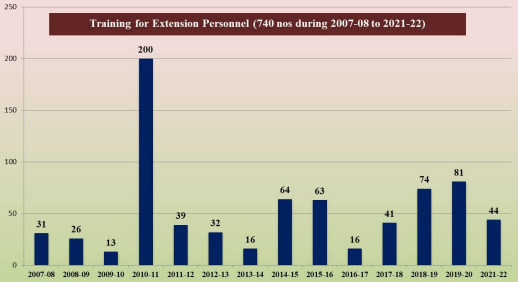
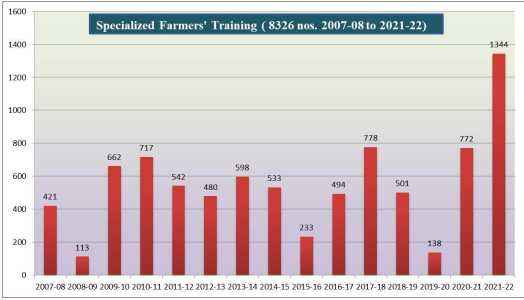
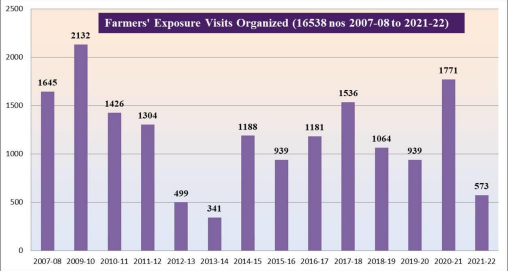
Agri Business Incubation Unit, ICAR-IIPR, Kanpur
- Entrepreneurial ecosystem in our country is expanding and evolving continuously with newer players and institutions coming into its fold. ICAR-IIPR, Kanpur have also joined this ecosystem in focus on pulse crops with establishment of Agri Business Incubation Unit (ABI unit) in the year 2019 under National Agriculture Innovation Fund ICAR, New Delhi.
- At IICAR-IIPR the Agri Business incubation unit is a technology based incubation centre that has the mandate to promote innovation, entrepreneurship and business creation related to pulses. The identified focus areas for incubation support are:
- Seed Production of Pulse Crops
- Bio-fertilizer
- Bio-pesticides
- Pulse processing
- Entrepreneurship development
- Value Addition of pulses with special reference to Value addition from pulse milling byproducts
- The incubation unit has a strong team of mentors for providing the technological support. Besides technological support, the unit provides basic support for business development.
- The incubation unit is also providing a basic platform to incubatees to showcase their product at ABI sale counter —DalhanHaat at the institute gate for incubatee can also do the sale of their product on pilot basis. .
Current incubates:
- 1. Mamta Agro India (MAI) ,Kanpur – who signed an agreement for transfer of technology related to “Protocols for milling of pulses in IIPR Mini Dal Mill’ and incubation support on 8th October 2021. MAI started starting functioning in Dec, 2021.This firm is preparing unpolished dal of mungbean, urdbean, pigeon pea, lentil, chickpea.
- 2. MahodhyaAgriworks signed MoA on high fiber and protein rich biscuits from pulse by-products for incubation support for six months (i.e. 16thAugust 2022 to 15th February 2023). The incubatee has launched his Delomeo brand of handmade cookies on 05th September 2022 on the occasion of institute foundation day, in the presence of Hon’ble DDG (Crop Sciences), ICAR, New Delhi, Dr. T.R. Sharma, Hon’ble ADG (Oilseeds and Pulses), ICAR, New Delhi, Dr, Sanjeev Gupta and Director, ICARIIPR, Kanpur, Dr. Bansa Singh.
- ABI unit has successfully generated a total revenue of 1.40 lakh as charges for incubation support, royalty, operational expenses for equipment usage on actual basis and ABI membership fee.
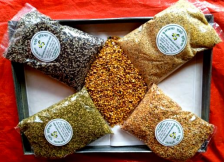
Team Agri-Business Incubation Unit
- Dr. G.P. Dixit, Director, ICAR-IIPR, Kanpur-Chairman
- Dr. Uma Sah, PI & In charge, ABI unit, ICAR-IIPR, Kanpur
- Dr. Prasoon Verma, CO-PI& Mentor, ABI unit, ICAR-IIPR, Kanpur
- Dr. Aditya Pratap, CO-PI, ABI unit, ICAR-IIPR, Kanpur
- Dr. P. K. Katiyar, CO-PI& Mentor, ABI unit, ICAR-IIPR, Kanpur
- Dr. R. K. Mishra, CO-PI& Mentor, ABI unit, ICAR-IIPR, Kanpur
- Dr. Senthil, CO-PI& Mentor, ABI unit, ICAR-IIPR, Kanpur
- Mr. Jitendra Ojha, Business manager, ABI unit, ICAR-IIPR, Kanpur
- Mr Mohit Katiyar, Young Professional, ABI unit, ICAR-IIPR, Kanpur
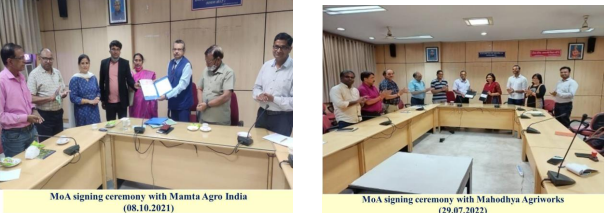
Research Achievements : Computer Applications & IT
Softwares/Databases/Portals developed
1. PulsExpert: An Expert System for Identification and Control of Diseases/Insect-pests in Pulse Crops
- PulsExpert is a web-based expert system developed for major pulse crops grown in India viz., Chickpea, Pigeonpea, Mungbean, Urdbean, Lentil and Pea
- It incorporates all the modern features like, automatic knowledge acquisition interface, knowledge acquisition from multiple experts, knowledge retrieval, incorporation of feedback from users and farmers
- Automatic knowledge acquisition system of PulsExpert provides user-friendly interface to the domain expert for entering, storing and structuring the domain specific knowledge
- The knowledge base of the system contains up to date information about 24 major diseases and 33 major insect-pests of pulses appearing right from seedling to maturity
- The system provides user-friendly interface to farmers and asks the textual as well as pictorial symptoms in the form of question-answers
- On the basis of answers, PulsExpert diagnosis the pulse crop diseases/insect-pests along with its confidence factor and suggests most appropriate control measures which are composed of cultural practices as well as chemical controls
- The user operates the system through the screens of a graphical user interface. The entire process involved in the disease diagnosis and treatment is done in three phases: Preliminary diagnosis, Final diagnosis and Suggesting control measures

Implementation of an Expert System for Insect-pests Management in Pulses.
Indian Journal of Agricultural Sciences 88(7): 1083-1087
2. Online Data Submission & Retrieval System for MULLaRP
- Online data submission and retrieval system for coordinated research trials in MULLaRP crops has been developed
- System facilitates the user to reduce the time and cost in data collection, data compilation, data analysis and report generation
- System has three online functional modules viz., Plant Breeding Data Entry & Submission Module, Data Analysis Module and Report Generation Module
- Data Entry & Submission module has the facilities for entering/storing data related to data booklet details, general notes on growing conditions and data on yield , days to 50% flowering, days to maturity, 100-seeds weight and plant height
- Data Analysis module performs RBD analysis and Report Generation module generates the reports of information sheet and location wise data based on crop, trial, zone & location.
- The system has been developed using ASP.NET with C# as the front-end and SQL Server 2005 as back-end.
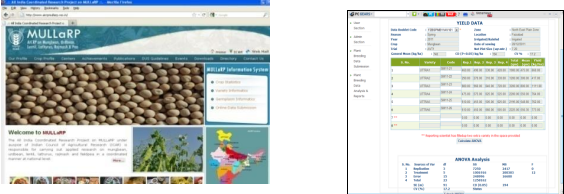
and implementation of on-line data submission and retrieval system for coordinated
research trials in food legumes. Legume Research 2: 137 – 146
3. Database and Information System for Plant Genetic Resources for Pulse Crops
- Database contains data on 1097 chickpea, 1058 pigeonpea, 550 mungbean, 734 urdbean and 480 accessions of fieldpea germplasm including agronomical, morphological & other traits
- System is web-based, user-friendly, menu driven and allows users to store, modify & delete germplasm information and perform search operations efficiently
- System has two components one for data management and other for generating queries and reports. Germplasm Data Management Module has been designed for data entry, data updation and data submission. The Germplasm Report Generation Module has been developed to retrieve/search germplasm information based on single character or combination of more than one characters.
- System provides statistical summary for each evaluation descriptor and its various descriptor states
- Total 4 main reports have been designed for retrieval of information 1. Qualitative report 2. Quantitative report 3. Query-based report 4. Detail report
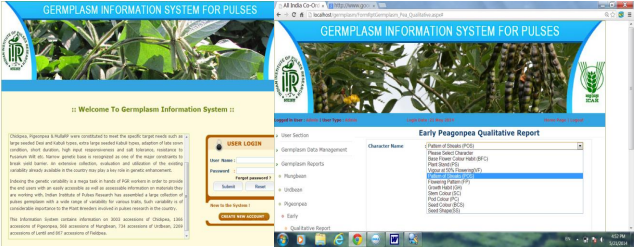
and development of web based database of urdbean germplasm. Int. J. Agri. Stat. Sci. 10
: 193-199.
Publication: Devraj, Singh Deepak and Pratap A. 2016. Online Database and
Information System for Mungbean Germplasm. Legume Research-An International
Journal 39(3): 349-354.
4. Web-based Commodity Profile for Pulses(CPP Portal)
Web-based commodity profile for Pulses is a digital platform developed on the available information related to improved production/protection technologies. This platform caters the information needs of exporters and farmers through the production and trade statistics. Another feature of the web-based data management platform is the indexing of mandi prices of chickpea from regulated market yards (from Agmarknet). Policy makers can directly access area, production, productivity trends and futuristic projections based on long-term data analysis. Information related to soil data, weather data, Minimum Support Prices(MSP), Breeder Seed Production(BSP), major export destinations and major import sources, and IT Crop Planner/Crop Calendar would be utilised for the development of data management portal for pulse crops
Contents on production statistics (area, production and productivity), trade statistics (import and export), Minimum Support Price (MSP), Crop Calendar, Mandi prices for Chickpea have been developed and analysed. A user-friendly structure has been created for digital platform. A home page for the system viz., commodity profile for pulses has been designed and linking with the developed contents (Fig.). The system operates on LINUX and Windows operating system. MySql and APACHE used for database management server and web server, respectively. PHP Script for server side scripting and HTML, CSS & J query (JavaScript) for client side scripting has been used in developing the system.
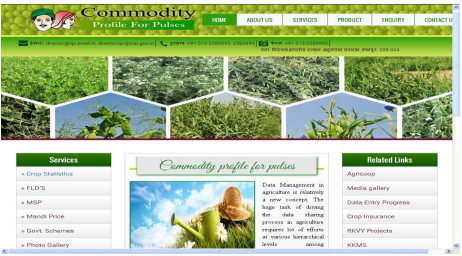
Publication : Devraj and Sah Uma. 2016. Development of Web-based Commodity
Profile for Chickpea. Pulses Newsletter: July-September, 27(3):6.
5. Farmer Mobile-based Applications for Pulses on mKRISHI Platform
Under this collaborative project with Tata Consultancy Services(TCS), a pilot has been designed to focus on best package of practices for ensuring better returns in major pulses viz., Chickpea, Pigeonpea, Mungbean, Urdbean, Lentil, Fieldpea and Rajmash through digital connect with farmers. The project was designed with the aims viz., Two way interactive system between the farmers and the scientists & other stakeholders, Enable farmers to timely receive information/advisory about disease/insect-pest, critical microclimate, weather information in local languages and facilitate better production and protection practices for major pulses. Different templates have been designed for data collection- Master data, Farmers, Best practices, Ask queries. Database structures have been developed for Farmer Mobile App services and Expert web console. The information/details were collected from 500 farmers of Uttar Pradesh, Madhya Pradesh and Karnataka and registered in the ICAR-IIPR mKRISHI System. A web-based platform (web console) has been customized for Farmer Management, Knowledge Management, Advisory Management, Information Management and Support Services (Fig. 2). Contents related to the best practices for Chickpea and Pigeonpea have been collected in English & Hindi languages and shared in the customized platform.
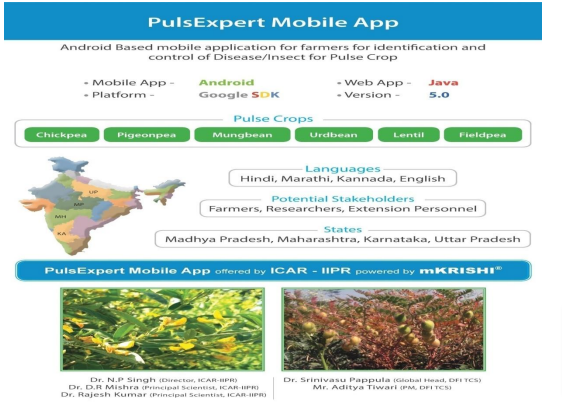

6. Seed Information System for Pulses (Pulses Seed Hub Portal)
Seed information system for pulses(Seed Hub Portal) has been developed, tested and refined for implementation. A prototype software has been developed for retrieval of seed hub information system using WAMP(Windows, Apache, Mysql and PHP) technology. System architecture contains three-tier architecture viz., client-side interface layer, server-side application layer and database layer. System has 3 basic functional modules viz., Database Design Module, Data Management Module and Report Generation Module. Contents on detail of Seed hub centres, Seed target, Seed production, Seed lifting, revolving fund, expenditure incurred, Seed balance, etc. have been collected, analysed and stored in digital format. An user-friendly structure has been created and different links have been customized for development of digital platform. Total 5 database forms (viz.,Centre details form, Seed target/production form, Seed sale/distribution form, Revolving fund form and Infrastructure development form) have been designed for data entry, updation, submission and analysis. Total 7 reports( viz., Centre details report, Seed target/production report, Seed sale/balance report, Revolving fund report, Infrastructure development report, Target/production graphical report and Seed availability report) were also generated. System provides the information needs of farmers, researchers, exporters and policy makers and also serve as an information highway for sharing the availability of the pulses seed in the country through the developed portal

Fig. 1: Home page of Seed Hub Portal.
7. E-Pulses Data Book
State-wise pulses production data for chickpea, pigeonpea, mungebean, urdbean lentil, pea and total pulses was collected for the period 1980-81 to 2020-21. State-wise/Zone-wise data were analyzed on the basis of means, growth patterns, instability, decomposition analysis and grouping on the basis of parameters identified (viz., less area-low yield, more area-high yield, less area-high yield and more area-low yield). State-wise database and information system has been designed, developed and tested using different test cases and has been implemented also at the Institute level. The same system is available on Institute website for its access/download data in the form of E-data book. “E-Pulses Data Book” is available on Institute’s website.
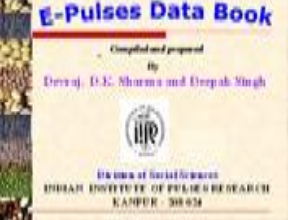
8. Copyrights/Trademark registered
A. Copyrights
- 1. Copyright of Software “PulsExpert: An Expert System for identification and
control of diseases/insect-pests in pulse crops” (Registration No.
L-65177/2017 dated 17-3-2017 )
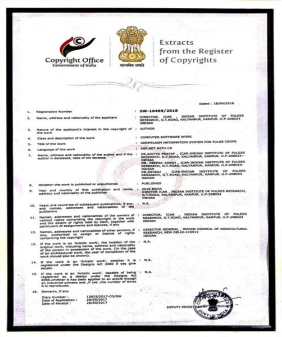
- Copyright of Software “IRS-MULLaRP” (Registration No. SW-10474/2018 dated 20-4-2018 )

- Copyright of Software “Germplasm Information System for Pulse Crops” (Registration No. SW 10469/2018 dated 18-4-2018).
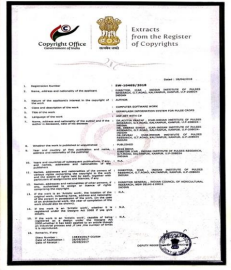
B. Trademark
Trademark of Logo “PulsExpert” (Trade Mark No. 3229366 dated 6-4-2016, Class No. 42, Published on 4-12-2019)
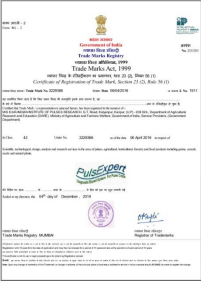
Research Achievements: Agricultural Statistics
- AMMI based simultaneous selection for yield and stability of chickpea genotypes in south zone of India AMMI model decomposition has been used to developed an index , as it captures large portion of GEI sum of squares. Yield index has been computed by taking ratio of each genotypes to the average of all the genotypes. Stability index/information has been computed by taking reciprocal of sum of squares that represents genotype.The combined index is linear combination of yield and stability index.
- Growth, instability and time series decomposition of price indices of pulses in India
Price analysis of pulses helps to understand trends, variability and seasonality in price series which is useful for different stakeholders such as farmers, consumers, traders and policy makers. Seasonal indices revealed that price indices of pulses were higher during the months of October and November along with higher variability during these months. - Growth, Instability and Decomposition Analysis of Lentil Production in India
The compound growth rates of area, production and yield of lentil was found positive and the area, production and yield instability were of low order. Decomposition analysis reveals that overall the change in production is due to all the three component yield, area and interaction of yield and area
Research Achievements: Agricultural Economics
An impact assessment of major pulses (Chickpea, Pigeon pea, Mungbean, and Fieldpea) varieties has been initiated since December 2021
Scientists and their area of specialization

